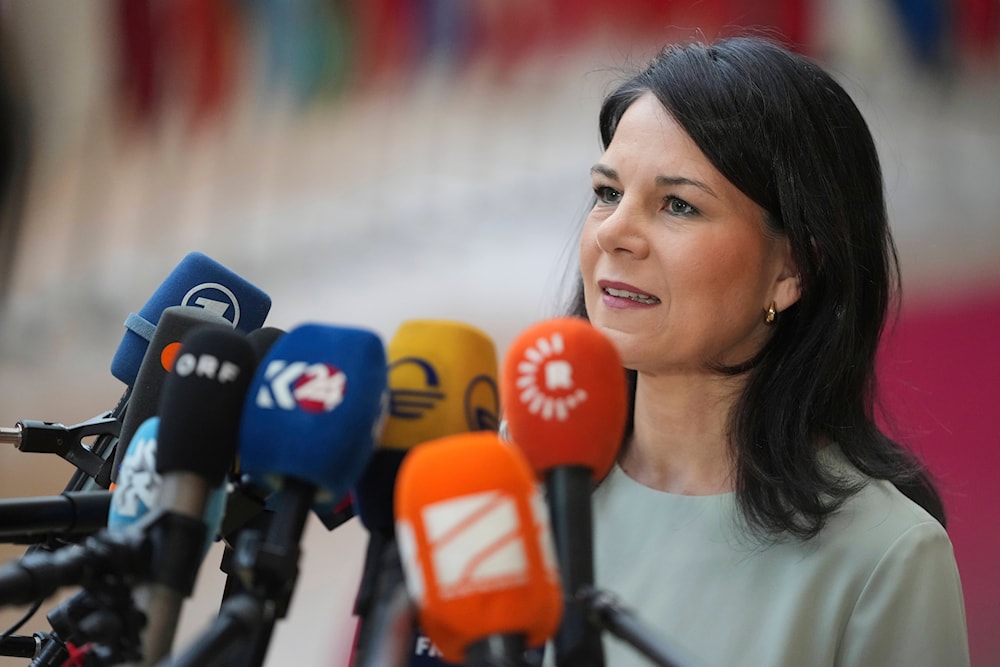Germany pledges $326 million in aid for Syrians at EU conference
Germany's pledge comes in the aftermath of massacres by government-linked forces targeting Alawites on the Syrian coast, killing 1,500 civilians according to the most recent statistics.
-

Germany's Foreign Minister Annalena Baerbock speaks with the media as she arrives for a meeting of EU foreign ministers at the European Council building in Brussels, on March 17, 2025. (AP)
Germany has pledged millions of dollars in aid to Syrians in their country, as well as refugees and their host countries, through the United Nations and other international organizations.
Berlin pledged 300 million Euros (326 million dollars), according to the German Foreign Minister Anna Baerbock on Monday before the EU-led donor conference in Belgium, noting that more than half of the funds will be aimed towards the people in Syria, and will be implemented without the transitional government.
Syrian refugees and host communities in Jordan, Lebanon, Iraq, and Turkiye will also receive the support, which includes food, health services, emergency shelters, and protective measures for the particularly vulnerable, according to the Foreign Ministry.
"As Europeans, we stand together for the people of Syria, for a free and peaceful Syria," Baerbock said, repeating the importance of an inclusive political process to guarantee a peaceful future for Syria while calling for the transitional government to investigate the killing of thousands of civilians in Alawite villages and hold those responsible accountable. Other countries have also been trying to aid Syria.
Countries ease sanctions on Syria
Switzerland has lifted some sanctions on Syria in line with a similar decision by the European Union, citing recent political changes in Damascus, as the Swiss Federal Council announced on March 7 that the relaxation of restrictions aims to support a political transition in the country.
The Federal Council lifted certain sanctions against Syria, aligning with the European Union’s decision, as the Swiss government confirmed in a statement, with the policy shift allowing certain financial services and banking relationships while also easing restrictions on Syria's energy and transport sectors.
Switzerland’s move comes after the UK lifted sanctions on several Syrian entities in a similar effort.
The United Kingdom lifted sanctions on 24 Syrian entities on March 7, including the Central Bank of Syria, Syrian Arab Airlines, and energy companies, as a spokesperson for the Foreign, Commonwealth, and Development Office (FCDO) stated, while sanctions will remain on Syrian nationals the office claims are affiliated with the previous Syrian regime, as well as others allegedly involved in drug trafficking.
Canada followed the UK and Switzerland's suit on March 13, lifting sanctions to allow funds to be transferred through specific banks, including the central bank of Syria, according to Canada's ambassador to Lebanon, Stefanie McCollum, will became a non-resident ambassador of Canada to Syria.
Previously, the European Union announced on February 24 that the EU Council would suspend sanctions in the transport and energy sectors, including oil, gas, and electricity, while also removing five entities—the Industrial Bank, Popular Credit Bank, Saving Bank, Agricultural Cooperative Bank, and Syrian Arab Airlines—from the list of those subject to a freeze on funds and economic assets.
The press release published by the EU "aims to facilitate engagement with Syria, its people, and businesses, in key areas of energy and transport, as well as to facilitate financial and banking transactions associated with such sectors and those needed for humanitarian and reconstruction purposes."

 3 Min Read
3 Min Read








